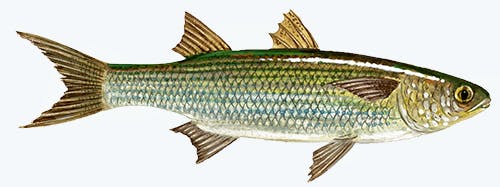All feed formulas developed by Aller Aqua at the Aller Aqua Research Centre follow these requirements to ensure proper growth and health:
High-Protein Diet:
Mullet diets typically contain 30–35% protein, reflecting their omnivorous and detritivorous feeding habits. Protein sources include fishmeal, soybean meal, wheat middlings, and algae-based ingredients. Juvenile mullets benefit from slightly higher protein levels to support early growth stages.Fat and Energy Needs:
Fat content is moderate, ranging from 6–10%, with energy derived from fish oil, soybean oil, and other plant-based lipids. Mullet efficiently utilize low-energy diets, and careful balancing of protein-to-energy ratio ensures optimal growth without excess fat accumulation.Essential Nutrients:
Feeds are supplemented with vitamins A, D, C, and E for immune function and growth. Key minerals like calcium, phosphorus, magnesium, and selenium support skeletal development and metabolic processes. Omega-3s are included to improve stress resistance and enhance final product quality for consumers.
